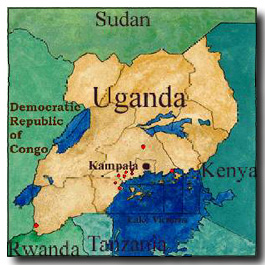Uganda Winning the Battle Against AIDS Using Abstinence
- SARAH TRAFFORD
Uganda may be on its way to wiping out AIDS by using the Biblical values of chastity and fidelity, a new Harvard University study finds. According to the study, abstinence education has shown significant effectiveness in reducing AIDS in Uganda, with the HIV infection rate dropping 50 percent between the years 1992 and 2000.
 |
The east African nation is making a big impact with the revelation that the AIDS epidemic can be curbed. Riddled with HIV infections since the 1970s, Uganda has found miraculous success by using abstinence as its prevention strategy. Promotion of abstinence through billboards, radio programs and school sex education curricula has resulted in a slow and steady drop in HIV infection rates, as well as new attitudes about conquering AIDS in Uganda.
"Uganda is one of the countries that attach great importance on promoting abstinence among our youth," said Ahmed Ssenyomo, minister counselor at the Ugandan Embassy, in a speech to the African American Youth Conference on Abstinence.
When the program started in the late 1980s, the number of pregnant women infected with HIV was 21.2 percent. By 2001, the number was 6.2 percent. The Harvard study also reported Ugandan adults are not having as much risky sex: of women 15 and older, those reporting many sexual partners dropped from 18.4 percent in 1989 to 2.5 percent in 2000.
The emphasis on abstinence in Uganda's program is unique. In other nations with high HIV infections, such as Zimbabwe and Botswana, condoms have been promoted as the answer to ending the AIDS crisis. In Botswana, 38 percent of pregnant women were HIV positive last year, contrasted with 6.2 percent of Ugandan women.
Much of the program's success is due to the nation's willingness to look beyond the sexual revolution to the past.
"What we're seeing in parts of Africa is communities responding to the epidemic by saying, Let's see what's in our culture how can we deal with this with what we had in the past?" Susan Leclerc-Madlalas, a medical anthropologist at the University of Natal in South Africa, told the Associated Press. "What they had most of the time was a way of regulating sexuality."
Many AIDS officials reject abstinence as a potential prevention strategy despite evidence that promotion of abstinence and fidelity have significantly reduced AIDS cases in Uganda over the past decade.
"Millions and millions of young people are having sexual relations," said Paolo Teizeria, director of Brazil's AIDS program, at the 14th International AIDS Conference. "We cannot talk about abstinence. It's not real."
Abstinence is often dismissed as a potential prevention method. Condom promotion and "safe-sex" initiatives have long been thought to be the answer to stopping the spread of HIV: Instead of encouraging people to curb their libidos, these initiatives have tried to provide "safer" ways of exercising them. However, in many African nations condoms arent looked upon kindly: there are a variety of urban legends that circulate in some regions that condoms are either ethnic cleansing tools or actually spread HIV themselves. (During the Cold War, the Soviet KGB spread "disinformation" that the United States created the AIDS virus to kill off Africans.)
"Ugandans really never took to condoms," Dr. Vinand Nantulya, an infectious disease advisor to Ugandan leader Yoweri Museveni, told The New Republic.
The abstinence initiative in Uganda goes far beyond those who are already having sex; it starts with the education and promotion of an abstinence program for youth called "True Love Waits." Thirty thousand Ugandan youth are currently involved with the program. Launched in Uganda in 1994, True Love Waits focuses on abstinence until marriage as a way to prevent all sorts of adverse consequences associated with extra-marital sexual activity.
"Encouraging marriage, monogamy or abstinence, delaying the onset of sexual activity, discouraging promiscuity and casual sex, reducing the supply and demand of illegal drugs or providing treatment to drug addicts are the absolute most effective approaches to reducing the risk of HIV," Rep. Mark Souder (R-Indiana) and six other members of the U.S. Committee on Government Reform said in a letter to the United Nations.
The United States and other countries have yet to embrace abstinence promotion as a mode of AIDS prevention. The United Nations recently predicted that AIDS will wipe out half the population in some African countries. In Uganda, the proverbial sun is starting to shine from the rain cloud of AIDS deaths and it's looking brighter.
 This is Meaghen Gonzalez, Editor of CERC. I hope you appreciated this piece. We curate these articles especially for believers like you.
This is Meaghen Gonzalez, Editor of CERC. I hope you appreciated this piece. We curate these articles especially for believers like you.
Please show your appreciation by making a $3 donation. CERC is entirely reader supported.

Acknowledgement
Sarah Trafford. "Uganda Winning the Battle Against AIDS Using Abstinence." Culture and Family Institute (July, 2002).
This article reprinted with permission from Culture and Family Institute. Culture and Family Institute is an affiliate of Concerned Women for America 1015 Fifteenth St. NW, Suite 1102 Washington, D.C. 20005 Phone: (202) 289-7117 Fax: (202) 488-0806 E-mail: mail@cultureandfamily.org
The Author
Sarah Trafford is an intern for the Culture & Family Institute of CWA and a Political Science major at The College Of Wooster in Wooster, Ohio.
Copyright © 2002 Culture and Family Institute



